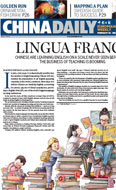Inflation concerns hit consumer confidence
Updated: 2011-02-25 11:14
By Hu Yuanyuan (China Daily European Weekly)
China's consumer confidence index saw its second consecutive quarterly decline in the last three months of 2010, mainly weighed down by people's expectations of higher inflation, research by the National Bureau of Statistics (NBS) and The Nielsen Company showed on Feb 23.
Meanwhile, the index fell to 100 from 104 in the third quarter, according to the research jointly conducted by the Chinese Economic Monitoring & Analysis Center under the NBS and The Nielsen Company.
Rural consumers' confidence remained relatively stable due to their strong faith in job prospects and personal finances while urban consumers' confidence fell, research showed.
On a city-tier basis, third- tier cities fell 9 percentage points, while fourth-tier cities declined 7 percentage points. Declines were also seen in Shanghai, Beijing and other first-tier cities, which fell 6 percentage points.
"The primary driver behind this decline is consumer price inflation, particularly food. This, in turn, has led to a decrease in consumers' willingness to spend money," says Mitch Barns, president of Nielsen Greater China.
The "willingness to spend" declined to 30 points in the latest quarter, compared with 41 in the previous quarter. Declines were seen across all cities and regions, with the northern region particularly affected, the report showed.
According to the report, 83 percent of consumers expect overall prices to increase in the next 12 months, up 6 percentage points from the previous quarter.
The country's inflation is running close to two-year highs, and some economists believe it could rise further in the coming months as global food prices soar.
Food prices currently account for a third of China's consumer price index.
"Concerns over inflation are affecting consumer confidence but so far the actual effect on consumer behavior and sales-volume growth is modest. I would expect the index to pick up again in the first quarter of this year after inflation peaked during the period," Barns says.
Besides inflation which was mainly boosted by food and property price increases, rising interest rates have also affected spending, he adds.
The central government introduced eight measures in January to curb rising home prices, including raising the minimum downpayment for second-home buyers from 50 percent to 60 percent and further tightening regulations that restrict home purchases. So far, more than 30 cities have released detailed rules in restricting home purchases.
"If these measures can effectively curb the growth in property prices, people will save less and will be more willing to spend. But if they don't work, it could backfire," Barns says.
Pan Jiancheng, deputy director-general of the China Economic Monitoring & Analysis Center at the NBS, says even though consumers may be less confident, there is no large-scale reduction in consumption occurring yet as total retail sales in China saw double-digit growth throughout 2010.
"Maybe it would be growing even more if concerns about inflation were reduced, but consumption is still showing solid growth nonetheless," Pan says.
E-paper

Lingua franca
Chinese are learning English on a scale never seen before and the business of teaching is booming.
Preview of the coming issue
Golden run ahead
Looking abroad
Specials

NPC & CPPCC sessions
Lawmakers and political advisers gather in Beijing to discuss major issues.

Sentimental journey
Prince William and Kate Middleton returned to the place where they met and fell in love.

Rent your own island
Zhejiang Province charts plans to lease coastal islands for private investments
